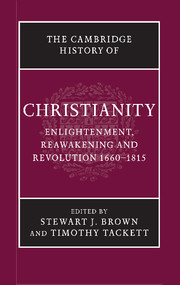Book contents
- Frontmatter
- Introduction
- PART I CHURCH, STATE, AND SOCIETY IN THE EUROPEAN WORLD, 1660–1780
- PART II CHRISTIAN LIFE IN THE EUROPEAN WORLD, 1660–1780
- 5 The Catholic clergy in Europe
- 6 The Protestant clergies in the European world
- 7 Reaching audiences: Sermons and oratory in Europe
- 8 Christian education
- 9 Christianity and gender
- 10 Popular religion
- 11 Jewish–Christian relations
- 12 Architecture and Christianity
- PART III MOVEMENTS AND CHALLENGES
- PART IV CHRISTIAN DEVELOPMENTS IN THE NON-EUROPEAN WORLD
- PART V REVOLUTION AND THE CHRISTIAN WORLD
- Chronology
- Bibliography
- Index
- References
8 - Christian education
from PART II - CHRISTIAN LIFE IN THE EUROPEAN WORLD, 1660–1780
Published online by Cambridge University Press: 28 March 2008
- Frontmatter
- Introduction
- PART I CHURCH, STATE, AND SOCIETY IN THE EUROPEAN WORLD, 1660–1780
- PART II CHRISTIAN LIFE IN THE EUROPEAN WORLD, 1660–1780
- 5 The Catholic clergy in Europe
- 6 The Protestant clergies in the European world
- 7 Reaching audiences: Sermons and oratory in Europe
- 8 Christian education
- 9 Christianity and gender
- 10 Popular religion
- 11 Jewish–Christian relations
- 12 Architecture and Christianity
- PART III MOVEMENTS AND CHALLENGES
- PART IV CHRISTIAN DEVELOPMENTS IN THE NON-EUROPEAN WORLD
- PART V REVOLUTION AND THE CHRISTIAN WORLD
- Chronology
- Bibliography
- Index
- References
Summary
Literacy, reading, and faith
One of the fundamental characteristics of the Protestant and the subsequent Catholic Reformations was the assertion that no one could claim to be a Christian unless they could account for their belief. Thus, Luther viewed the catechism as ‘something each Christian must absolutely know, so that anyone not knowing it will not be considered a Christian and will not be admitted to any of the sacraments’. Indeed, a strong link was established between religion and teaching among Protestants and Catholics alike. This link persisted throughout the early modern period, with the catechism, a unique expression in question-and-answer form of the dogmatic truths essential to belief (the Ten Commandments, the creeds, the principal prayers) viewed as an essential work, laid out for easy memorization by children. Luther had even maintained that it should be displayed on tablets (Tafeln), hung both in church, and in the school and home. Based on quotations from the gospel and the Pauline apostles, the Haustafel defined the Christian’s social obligations not only towards church authorities, but towards the prince, towards the father or master of the household, and towards the husband on the part of the wife. Over time, the compulsory nature of such religious education led to the development of writing and, more importantly, of reading skills – even if the nature of this apprenticeship varied by region and by country. In certain cases, the learning of Christian truths remained strictly church-centred and oral, memorized solely during Sunday catechism without the intermediary of books or school.
- Type
- Chapter
- Information
- The Cambridge History of Christianity , pp. 147 - 165Publisher: Cambridge University PressPrint publication year: 2006
References
- 1
- Cited by



